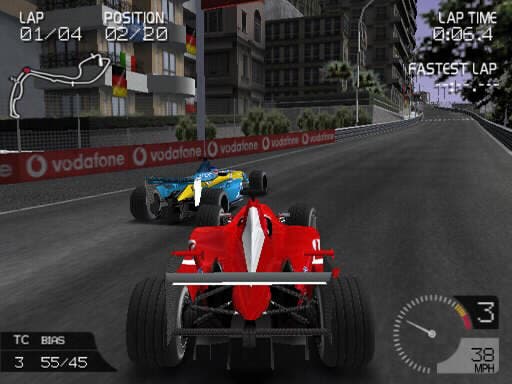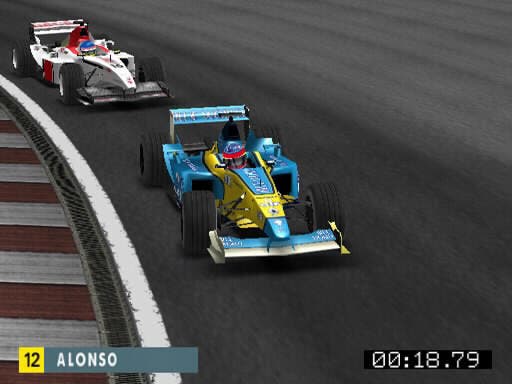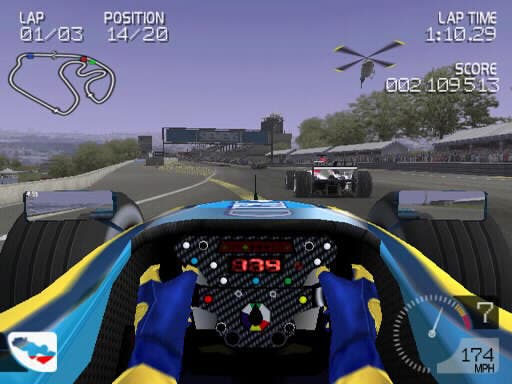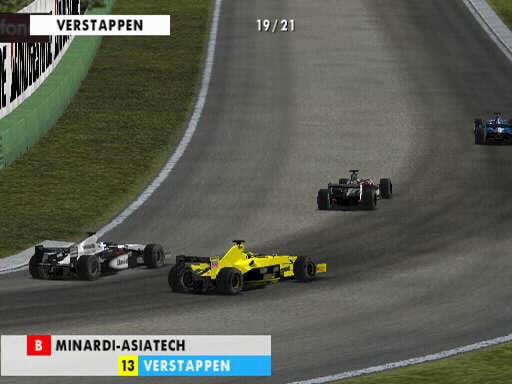Formula One 2003
Pole position or back of the grid?
Grand Prix racing is all well and good, but playing a game of spot the difference between half a dozen nigh on identical F1 titles has become about as much fun as a head on collision with a brick wall at 210mph.
And what of the sport itself? Despite this season's desperately introduced rule changes, designed to make F1 more exciting and unpredictable, the same old faces appear on the podium week after week, spraying champagne into each others smug faces. Short of forcing Michael Schumacher to tow a caravan, it's hard to think of what can stop the German android.
Sony, nevertheless, is feeling pretty pleased with itself after bagging the official F1 licence for the next four seasons, making the PS2 the only games machine (to the best of our knowledge) with a 2003-based F1 title, featuring all the new rules (e.g. the new 'all or nothing' Saturday qualifying lap) 20 drivers and their cars, all 10 teams and current liveries, as well as the promise of all 16 official Grand Prix circuits "mapped to an astonishing level of accuracy".
But does anyone care anymore?

Not bad going, but does anyone other than the devoted hardcore actually care? The radical decline in the sales of the associated videogames would suggest not, with the most recent Studio Liverpool attempts selling less than a quarter of the celebrated Psygnosis originals from '96 and '97. Clearly something had to change.
Drawing a line under the rather generic efforts of recent years, Studio Liverpool has finally breathed new life into this tired old series (now up to version eight, believe it or not) with a radically improved version that laps (sorry) EA's flagging franchise and does something to the F1 genre that no developer has managed for years: it makes it fun.
Studio Liverpool has essentially stripped the game down to its base elements and delivered an instantly enjoyable racing game that will have broad appeal. Not only do the controls lend themselves extremely well to such a lightning quick game, it's possibly the fastest and best looking F1 game we've ever seen, and as a result you can't help but enjoy it immediately.
Diving into the immaculate front end, the game offers a familiar series of options; in single player mode you get Arcade, Arcade Season, Custom Race, Race Weekend, Time Attack, and World Championship, while multiplayer offers Hot Seat, Arcade Race, Custom Race and Time Attack. As you'd expect, Arcade is the simple quick race means of diving into the game and selecting any track and any driver, while Arcade Season is similar, but runs the races in their seasonal order and tasks you with finishing in the top eight in order to progress to the next one. Time Attack, needless to say, is a straightforward solo ten lap challenge, which offers a trophy as a reward should you beat the preset time, while Custom Race gives you the choice of tailoring a race to your precise time, laps, difficulty, and so on. World Championship, meanwhile, gives serious F1 fans the ultimate test of taking on the entire expansive campaign with the emphasis firmly on simulation.
Go on, make the game less fun, you masochists

Although it's fairly obvious that Studio Liverpool's priorities have been to produce an accessible, more arcade-oriented F1 game, there are a plethora of options that petrol head purists can switch on to turn the game into something that will satisfy those with a penchant for bloody minded realism. Whether you'll get any more out of the game not having the various driving aids switched on is down to you, but it's reassuring to know that they're there, in case you suddenly find yourself getting too good at the game at the default settings.
If, like us, you don’t get particularly excited about the prospect of spending 10 hours learning how to take each and every corner, Formula One 2003 has exactly the right options to allow us to race the sport the way we want to; fast and dirty. But regardless of how you want to play it, you can't help but be impressed with the breadth and depth of the options available.
Equally impressive is the way the game looks. The sense of speed, for a start, is a crucial factor in F1 2003's immersiveness, something aided considerable by the classy game engine that the Liverpool team has devised. Each and every track is packed with detail, down to the individual trackside adverts, yet there is never any hint of pop up or the kind of draw distance issues that have blighted just about every F1 game ever made.
Even with all 20 cars battling it out at the start doesn’t seem to adversely affect the pace of the game, and even up close, the cars sport an impressive level of authentic detail, and kick up a pleasing amount of particle effects if you happen to get close enough. As you'd expect, the game sports a number of camera angles that all have their respective pros and cons, either giving an insane impression of speed or a more tactical behind the car view, but the bumper cam takes some beating for pure white knuckle thrills.
F for fun

Control wise, F1 2003 follows the well worn button configuration, but won us over with a responsive and direct handling system that allows you to really get stuck in and race without panicking that you're going to end up at the back of the pack every time you dare to drive at speeds of faster than 60mph. Arguably the amount of traction you get in F1 2003 is in no way realistic; you can fling the car around like it was a Mini Cooper at times, which is plainly ludicrous, but frankly not losing control at every turn is far preferable than the frustratingly anal, supposedly 'realistic' model that some of Sony's competitors insist on employing in their take on F1.
Picking holes is going to be easy for some of the purists, we've no doubt. It's easy to argue that being able to bash cars off the track shouldn't and wouldn't happen the way it does in F1 2003, and that the car's response to crashing into other vehicles is the racing equivalent of getting away with murder (or suicide at any rate), but like we keep saying, the emphasis is firmly on playability.
That's not to say F1 2003 is easy, because you can't just drive around like a psycho and expect to win races; you still have to approach each corner with the same considered, tactical approach that you would do under normal circumstances. The key difference with F1 2003 is that you feel like it's you driving, rather than feeling like you're fighting against a sluggishly vile attempt at reality. To help out, the game warns of approaching hairpin bends with a red arrow, orange for medium bends and green for bends that are safe to take at high speed. Heed these warnings and even the abject novice may stand a chance of posting impressive lap times within a few goes.
Bonkers physics

One area that the game does seem overly harsh, however, is its approach to car damage. For example, if you attempt a Monaco race in Arcade mode, the chances are you'll barely even make it around half a lap before the car explodes and it's Game Over. Given that it's hard to tell how damaged your car actually is (sadly there's no discernible damage modelling to speak of), you basically find yourself adopting a very polite driving style just so you can get around the track in one piece. Meanwhile, the crash physics seem slightly bonkers at times, with your car able to flip wildly into the air, and apparently carrying on driving like nothing's happened.
However, on the plus side, it was heartening to note that for once the AI drivers appear to be just as capable as you at making mistakes, and unlike so many other F1 games they don’t just stick like glue to their racing line. Under pressure they do noticeably make mistakes, so sometimes putting the pressure on M. Schumacher-style reaps rewards, albeit at the risk of making an arse of yourself and spinning off into the gravel.
If you haven't been motivated to buy an F1 game for a few years, then now's as good a time as any to get back into the much-maligned genre. Sure, there's barely anything that's genuinely new on offer here, and the fact is that it's still only an F1 game underneath its shiny new clothes.
Fastest lap
Scoring a game like this is a nightmare; for those with last season's version dock a point, or add one if you've never taken the plunge. Regardless, for straight up racing thrills at insane speeds, Sony's home grown effort is the best Formula One game money can buy.








